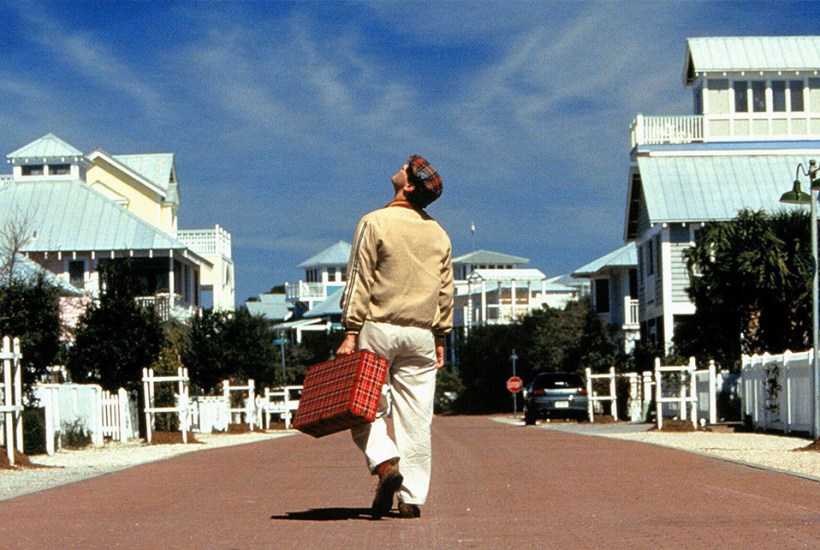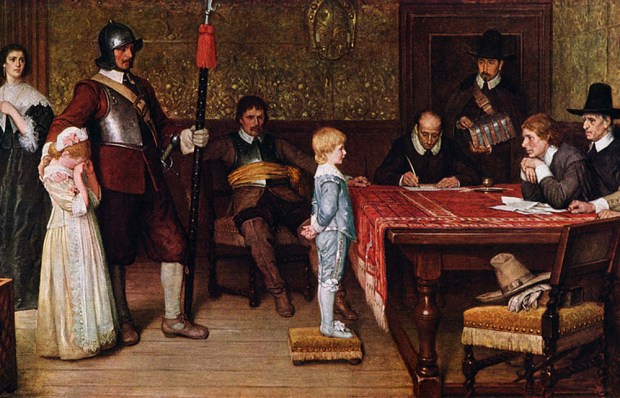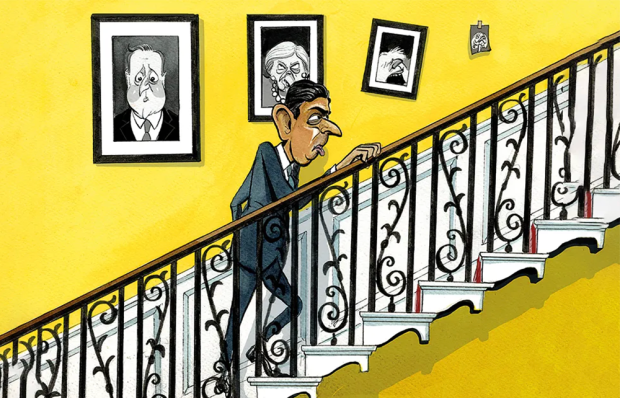In June 1999, I described on this page jameitos, tiny, blind, albino crabs on the sea bottom in a cave in Lanzarote, occasionally caught in a shaft of sunlight they couldn’t see. ‘Might there be searchlights moving across the surface of our world, too,’ I wrote, ‘catching [us] within their purview, and we the objects of this silent inspection, all unknowing?’
It was a long overnight flight from South America last month. Though comfortable, I couldn’t sleep, so I accessed the in-flight entertainment menu, selected ‘Comedy’ and decided to try The Truman Show, a 1998 American movie, not really a comedy, with (I later learnt) something of a cult following.
In a darkened cabin, sleeping passengers all around, in my tiny pool of light and headphone-generated surround-sound with no external stimuli to distract, I watched this film in the perfect circumstance for a strangely gripping, part-sci-fi, part-satirical, part-psycho-drama and (to me) almost religious experience.
So I might as well blurt this out: a confession you may think horribly inappropriate for (but certainly not unconnected with) Easter. I have an incipient messiah complex. I was both captivated and disturbed by a film with uncanny resonances with what has followed me all my life, hovering never close enough to overwhelm, and never so insistent as to supplant reason, but vaguely distracting me – though be assured I do know these suspicions are unfounded.
Here’s the gist of this film in a few sentences. Truman Burbank discovers that, his whole life since birth, he has been the sole subject of the already 30-year run of a wildly and internationally popular TV series, The Truman Show. ‘Seahaven Island’, where he has lived since birth, is actually a massive film set, hidden cameras everywhere, beneath a giant, invisible sky-high dome where even the weather can be controlled. Everyone else in the town, even his wife, is a secret member of the show’s TV cast. The film’s story is the story of Truman’s own dawning realisation of this, and his escape.
Truman thinks his world is real: that’s his dominating illusion. Mine is the stalking suspicion that mine isn’t. I actually suspect I may be, like Truman, the plaything of some mysterious cosmic force that has created all of you, my readers, and everyone and everything I encounter, as some kind of film set for the story of my life.
In Middlemarch, George Eliot points out that if you place a lighted candle on a scoured sheet of steel, ‘lo! the scratches will seem to arrange themselves in a fine series of concentric circles round that little sun… [T]he scratches are going everywhere impartially and it is only your candle which produces the flattering illusion of a concentric arrangement, its light falling with an exclusive optical selection’. Such, she says, is human solipsism. Be honest, reader. Suppose, as on a Tuesday afternoon you survey the soft-toiletry shelves of your local supermarket, a blade of celestial light falls upon you and from above a deep voice calls you by name. ‘You must have wondered what all this nonsense was about. This is not your home and these are not your people. Prepare for your return’ (or, in the words of Peter Gabriel’s 1977 ‘Solsbury Hill’: ‘“Son”, he said / “Grab your things, I’ve come to take you home”’)… would you be entirely surprised? I know my response: ‘Thank goodness. What took you so long?’
Walking London’s crowded streets, it has sometimes struck me that these people might all be holograms. The logic of that 17th-century bishop, George Berkeley, was surely impeccable: there is no way the viewer can prove the existence of the viewed. For Berkeley, the apparent is generated in the mind of God. For Truman, the apparent was generated by an ingenious TV producer. The pair might be surprised to find themselves in each other’s company but so they are, and I feel honoured to join them.
I repeat: I know I’m under a misapprehension. I shall never allow it to capture me. But nor shall I ever entirely shake it off. On an Easter weekend, I’ve no wish to offend Christian believers by labouring the suggestion that their messiah might also have been under a misapprehension; but any study of those whom Christians would call false messiahs reveals some disturbing similarities.
I profiled some of the most rascally in my book The Great Unfrocked. Abiezer Coppe, who founded the 17th-century Ranters, rather gives the game away with his ‘I can if it be my will, kisse and hug Ladies, and love my neighbours wife as my selfe, without sin’; as did the 19th century’s the Revd John Hugh Smyth-Pigott (‘The Lord hath need of £50. The Spirit would have this made known to you. Amen’).
We may suppose that these messiahs (and there have been many such) were scoundrels and well-aware of their deceit. But there have been a few of whom we may speculate that they genuinely believed it. You may wonder whether Joseph Smith genuinely believed that God had directed him to the buried Golden Plates, which he translated into the Book of Mormon, but I doubt Smith’s overall sincerity can be questioned so easily. Messiahs may persuade themselves and others of falsehoods, but the drive to spin a story at whose centre they stand may be born not of villainy but of an inner whisper that they are somehow special in the cosmic sense of that word. That the overwhelming majority of claimed messiahs have been male lends support to my suspicion that boys can more easily believe this of themselves. Most boys start life as messiahs to their mothers. Few girls do.
And there is, to my view, a final irony in The Truman Show. When Truman steps at last through the sky-blue wall of the fake world of which he was the centre, and into the real one of which he is not, he comes to us and to his former worldwide TV audience as an object almost of worship. In the very casting off of his celebrity, a new star is born.
Got something to add? Join the discussion and comment below.
Get 10 issues for just $10
Subscribe to The Spectator Australia today for the next 10 magazine issues, plus full online access, for just $10.
You might disagree with half of it, but you’ll enjoy reading all of it. Try your first month for free, then just $2 a week for the remainder of your first year.















Comments
Don't miss out
Join the conversation with other Spectator Australia readers. Subscribe to leave a comment.
SUBSCRIBEAlready a subscriber? Log in